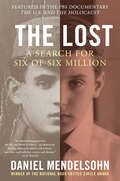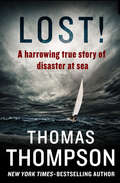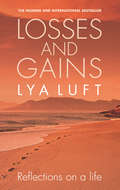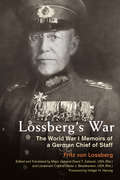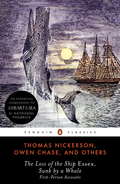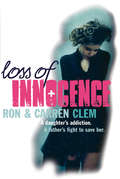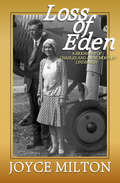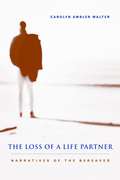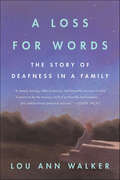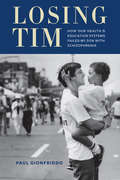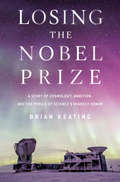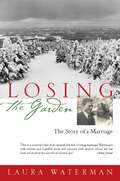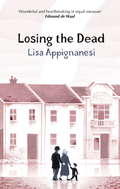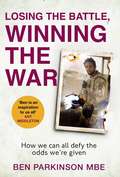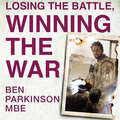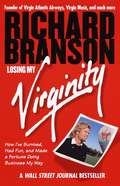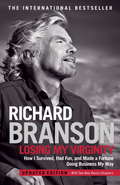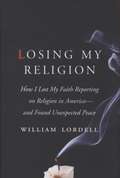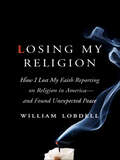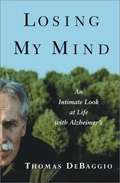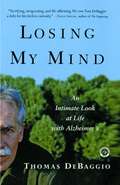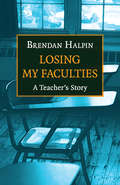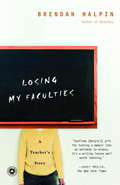- Table View
- List View
The Lost: A Search for Six of Six Million
by Daniel MendelsohnIn this rich and riveting narrative, a writer's search for the truth behind his family's tragic past in World War II becomes a remarkably original epic--part memoir, part reportage, part mystery, and part scholarly detective work--that brilliantly explores the nature of time and memory, family and history.
Lost!: A Harrowing True Story of Disaster at Sea
by Thomas ThompsonFrom the bestselling author of Blood and Money: A haunting true story of three people locked in a fierce struggle against time and the sea—and each other. In July 1973, Bob Tininenko; his wife, Linda; and his brother in-law, Jim Fisher, set sail from Tacoma, Washington, on a thirty-one-foot trimaran down the West Coast to Costa Rica. The journey was expected to take a matter of weeks, but ten days into the cruise, the party encountered a freak storm off the coast of northern California. When gale-force winds and fifty-foot waves capsized their boat, the voyage became a nightmare. For seventy-two days, the trio was lost at sea. Challenged by nature and compromised by a bitter rivalry, their courage and will to live was put to the ultimate test. Jim, the owner and skipper of the boat, was a devout fundamentalist whose recognition of God’s will in every event brought him into increasing conflict with his brother-in-law. As the two men battled to take control of a dire situation, Linda kept a secret that would lead to heartrending tragedy. A “hair-raising” (Houston Chronicle) account of shipwreck and survival and a searing portrait of faith without reason, Lost! is an unforgettable true story from “a writer of tremendous power and achievement” (Detroit Free Press).
Losses and Gains: Reflections on a Life with a Foreword by Paolo Coelho
by Lya Fett LuftIn her bestselling book Losses and Gains, Lya Luft draws on her own experiences of loss and gain in marriage and family to address the universal themes of childhood, love and maturity. She portrays love as the common thread through all phases of life. As children, the unconditional love we receive from our parents determines our expectations for all the other forms of love we experience later. And as adults, she argues, the complex task of loving another depends, initially, on self-love and self-esteem. Luft's ardent reflections on existence and the human spirit are a powerful reminder to us all: we have lost everything only when we believe we deserve less than everything still to be gained.
Lossberg's War: The World War I Memoirs of a German Chief of Staff (Foreign Military Studies)
by Fritz von LossbergGeneral Fritz von Lossberg (1868--1942) directed virtually all the major German defensive battles on the Western Front during the First World War. Hailed as "the Lion of the Defensive," he was an extremely influential military tactician and, unlike many other operations officers of his era, was quick to grasp the changes wrought by technology.Now available for the first time in English, Lossberg's memoir explains how he developed, tested, and implemented his central principles -- flexibility, decentralized control, and counterattack -- which were based on a need to adapt to shifting conditions on the battlefield.Lossberg first put his theory of elastic defense combined with defense-in-depth into practice during the Battle of Arras (April--May 1917), where it succeeded. At the Battle of Passchendaele (June--November 1917), his achievements on the field proved the feasibility of his strategy of employing a thinly manned front line that minimized the number of soldiers exposed to artillery fire. Lossberg's tactical modernizations have become essential components of army doctrine, and Lossberg's War: The World War I Memoirs of A German Chief of Staff will take readers inside the mind of one of the most significant military innovators of the twentieth century.
The Loss Of The Ship Essex, Sunk By A Whale
by Thomas Nickerson Owen Chase Nathaniel Philbrick Thomas PhilbrickThe gripping first-hand narrative of the whaling ship disaster that inspired Melville’s Moby-Dick and informed Nathaniel Philbrick’s monumental history, In the Heart of the Sea. In 1820, the Nantucket whaleship Essex was rammed by an angry sperm whale thousands of miles from home in the South Pacific. The Essex sank, leaving twenty crew members drifting in three small open boats for ninety days. Through drastic measures, eight men survived to reveal this astonishing tale. The Narrative of the Wreck of the Whaleship Essex, by Owen Chase, has long been the essential account of the Essex’s doomed voyage. But in 1980, a new account of the disaster was discovered, penned late in life by Thomas Nickerson, who had been the fifteen-year-old cabin boy of the ship. This discovery has vastly expanded and clarified the history of an event as grandiose in its time as the Titanic. This edition presents Nickerson’s never-before-published chronicle alongside Chase’s version. Also included are the most important other contemporary accounts of the incident, Melville’s notes in his copy of the Chase narrative, and journal entries by Emerson and Thoreau. .
Loss Of Innocence: A daughter's addiction. A father's fight to save her.
by Carren Clem Ron ClemThe Clems were a family living the American dream until their fifteen-year-old daughter Carren became addicted to Meth. Within two months of first taking the highly addictive drug, Carren had moved out of the family home, spent her entire savings on Meth and resorted to stealing, dealing and prostitution to pay for her habit. Told from both Carren's perspective and from the perspective of her father Ron, Loss of Innocence shares the shocking story of how a middle-class girl growing up in a stable home could get so lost. A former LA police officer, Ron describes how he went back to being a cop to try to rescue his daughter and how he suffered a heart attack in the street when he witnessed Carren selling herself to a drug dealer; Carren shares the events leading up to her first taste of drugs, and her descent into addiction with moving candour and dignity.Carren is now clean and sober, and in this frank, compelling book she and her family prove that there can be life after drug addiction.
Loss of Eden: A Biography of Charles and Anne Morrow Lindbergh
by Joyce MiltonFor the first time, Joyce Milton gives us the dual biography of the wonder couple, Charles and Anne Morrow Lindbergh. Their love prevailed against a horrifying kidnapping and murder splashed throughout the media, their careers, and even the criticism they underwent following their involvement in the America First movement as the United States entered World War II. With new information presented about their son&’s kidnapper, Bruno Hauptmann, and Charlie&’s own role in the case, Milton gives her readers a lot to think about. Thoroughly researched, Milton exposes a new understanding of and view into the personalities and lives of Charles, Anne, and the time they lived in.
The Loss of a Life Partner: Narratives of the Bereaved
by Carolyn Ambler WalterAlthough there is extensive research on the loss of a spouse, predominantly focusing on the experiences of widows, much less attention is paid to bereaved partners not married to their significant other, whether or not the partners are of the same sex. This first-of-its-kind work explores both socially sanctioned and disenfranchised grief, highlighting similarities and differences. Combining a discussion of various theories of grief with personal narratives of grieving men and women drawn from numerous interviews, and detailed case study analysis, Carolyn Ambler Walter has produced a penetrating examination of the bereavement experiences of partners in varying types of relationships. She views narratives of widows, widowers, and bereaved domestic gay and lesbian partners from a postmodern perspective that breaks away from the traditional belief that the living must detach themselves from the dead in order to move on with their lives. Instead, building on the works of postmodern grief theorists such as Klass, Silverman, and Nickman, Walter views ongoing bonds with the dead as a resource for enriching functionality in the present, and as a key to looking to the future.
A Loss for Words: The Story of Deafness in a Family
by Lou Ann Walker"A deeply moving, often humorous, and beautiful account of what it means to be the hearing child of profoundly deaf parents . . . I have rarely read anything on the subject more powerful or poignant than this extraordinary personal account by Lou Ann Walker." — Oliver SacksFrom the time she was a toddler, Lou Ann Walker acted as the ears and voice for her parents, who had lost their hearing at a young age. As soon as she was old enough to speak, her childhood ended, and she immediately assumed the responsibility of interpreter—translating doctors’ appointments and managing her parents’ business transactions. Their family life was warm and loving, but outside the home, they faced a world that misunderstood and often rejected them. In this deeply moving memoir, Walker offers us a glimpse of a different world, bringing with it a broader reflection on how parents grow alongside their children and how children learn to navigate the world through the eyes of their parents.
Losing Tim: How Our Health and Education Systems Failed My Son with Schizophrenia
by Paul GionfriddoPaul Gionfriddo's son Tim is one of the "6 percent"—an American with serious mental illness. He is also one of the half million homeless people with serious mental illnesses in desperate need of help yet underserved or ignored by our health and social-service systems.In this moving, detailed, clear-eyed exposé, Gionfriddo describes how Tim and others like him come to live on the street. Gionfriddo takes stock of the numerous injustices that kept his son from realizing his potential from the time Tim first began to show symptoms of schizophrenia to the inadequate educational supports he received growing up, his isolation from family and friends, and his frequent encounters with the juvenile justice system and, later, the adult criminal-justice system and its substandard mental health care. Tim entered adulthood with limited formal education, few work skills, and a chronic, debilitating disease that took him from the streets to jails to hospitals and then back to the streets. Losing Tim shows that people with mental illness become homeless as a result not of bad choices but of bad policy. As a former state policy maker, Gionfriddo concludes with recommendations for reforming America's ailing approach to mental health.
Losing the Nobel Prize: A Story Of Cosmology, Ambition, And The Perils Of Science's Highest Honor
by Brian KeatingThe inside story of a quest to unlock one of cosmology’s biggest mysteries, derailed by the lure of the Nobel Prize. What would it have been like to be an eyewitness to the Big Bang? In 2014, astronomers wielding BICEP2, the most powerful cosmology telescope ever made, revealed that they’d glimpsed the spark that ignited the Big Bang. Millions around the world tuned in to the announcement broadcast live from Harvard University, immediately igniting rumors of an imminent Nobel Prize. But had these cosmologists truly read the cosmic prologue or, swept up in Nobel dreams, had they been deceived by a galactic mirage? In Losing the Nobel Prize, cosmologist and inventor of the BICEP (Background Imaging of Cosmic Extragalactic Polarization) experiment Brian Keating tells the inside story of BICEP2’s mesmerizing discovery and the scientific drama that ensued. In an adventure story that spans the globe from Rhode Island to the South Pole, from California to Chile, Keating takes us on a personal journey of revelation and discovery, bringing to vivid life the highly competitive, take-no-prisoners, publish-or-perish world of modern science. Along the way, he provocatively argues that the Nobel Prize, instead of advancing scientific progress, may actually hamper it, encouraging speed and greed while punishing collaboration and bold innovation. In a thoughtful reappraisal of the wishes of Alfred Nobel, Keating offers practical solutions for reforming the prize, providing a vision of a scientific future in which cosmologists may, finally, be able to see all the way back to the very beginning.
Losing the Garden: The Story of a Marriage
by Laura WatermanIn 1971, Laura and Guy Waterman decided to give up all the conveniences of life and live self-sufficiently for the land, in a cabin in the mountains of Vermont. For nearly three decades they created a deliberate life, eating food they grew themselves and using no running water or electricity. Losing The Garden is an honest account of their marriage, seen as idyllic but riddled from within, as well as the event that would end it - the day Guy climbed a summit and sat down among the rocks to die.This is the memoir of a woman who was compelled to ask herself, "How could I support my husband's plan to commit suicide?" In her intimate examination, we explore the intricate and dark family histories of this couple, and reach a deep understanding of the marriage that tried to transcend them. At its heart, this is a love story and an affirmation of life after loss.
Losing the Dead (Vmc Ser. #103)
by Lisa AppignanesiAs her mother slipped into the darkness of old age, Lisa Appignanesi began to realise how little she knew of the reality behind the tales she had heard since childhood. She had shunned her parents' stories of war-time Poland, but now she set out to find the truth. In her quest she flew to Warsaw - imagining and revisiting a past she never knew.This is the moving story of the Jews who survived outside the camps, but it is also the author's own voyage of self-discovery - a family memoir of the rites of passage of emigration, childhood, and growing up an outsider in a closed community
Losing the Dead (Vmc Ser. #103)
by Lisa AppignanesiAs her mother slipped into the darkness of old age, Lisa Appignanesi began to realise how little she knew of the reality behind the tales she had heard since childhood. She had shunned her parents' stories of war-time Poland, but now she set out to find the truth. In her quest she flew to Warsaw - imagining and revisiting a past she never knew.This is the moving story of the Jews who survived outside the camps, but it is also the author's own voyage of self-discovery - a family memoir of the rites of passage of emigration, childhood, and growing up an outsider in a closed community
Losing the Battle, Winning the War: How we can all defy the odds we're given
by Ben Parkinson'A great and inspiring book from Doncaster's bravest son. Read it in a day' - Jeremy Clarkson 'Ben is the embodiment of positive thinking. What he has achieved, in large part through willpower, is nothing short of miraculous. An inspiration to us all' - Ant Middleton The story of Ben Parkinson MBE, the most injured soldier to have survived Afghanistan---What were you doing when you were 22? Where were you in the world? What did you want to do with your life? Ben Parkinson was a 6'4" Paratrooper. He was in Afghanistan fighting for his country. He wanted to always be a soldier, to be a father and to get home in one piece. But we don't always get what we want. So the question is: how do we react when that happens? Easy: You find something new to fight for.Ben Parkinson MBE is an inspiration to everyone. He suffered 37 injuries when his Land Rover hit a mine in Helmand in 2006, including brain damage, breaking his back and losing both his legs. This book follows the story of what led him to that moment his life changed forever - and what happened next. Doctors didn't think Ben could survive the trauma - then they didn't think he would wake up, or talk again, or walk again. Time after time, Ben pushed the ceiling on what was possible, going on to carry the Olympic flame in 2012 and receiving an MBE for the enormous feats he has undertaken for charity.What he has achieved in the face of adversity - for others as well as for himself - is nothing short of a miracle. Nerve-wracking, heart-warming and full of classic soldier's humour, Losing the Battle, Winning the War is a book you'll be thinking about long after the last page. 'Ben Parkinson is my hero. His story is one of immeasurable courage and character, a testament to the extraordinary resilience of the human spirit' Dan Jarvis MP, author of Long Way Home
Losing the Battle, Winning the War: How we can all defy the odds we're given
by Ben Parkinson'Ben is the embodiment of positive thinking. What he has achieved, in large part through willpower, is nothing short of miraculous. An inspiration to us all' - Ant Middleton 'A great and inspiring book from Doncaster's bravest son. Read it in a day' - Jeremy Clarkson The story of Ben Parkinson MBE, the most injured soldier to have survived Afghanistan---What were you doing when you were 22? Where were you in the world? What did you want to do with your life? Ben Parkinson was a 6'4" Paratrooper. He was in Afghanistan fighting for his country. He wanted to always be a soldier, to be a father and to get home in one piece. But we don't always get what we want. So the question is: how do we react when that happens? Easy: You find something new to fight for.Ben Parkinson MBE is an inspiration to everyone. He suffered 37 injuries when his Land Rover hit a mine in Helmand in 2006, including brain damage, breaking his back and losing both his legs. This book follows the story of what led him to that moment his life changed forever - and what happened next. Doctors didn't think Ben could survive the trauma - then they didn't think he would wake up, or talk again, or walk again. Time after time, Ben pushed the ceiling on what was possible, going on to carry the Olympic flame in 2012 and receiving an MBE for the enormous feats he has undertaken for charity.What he has achieved in the face of adversity - for others as well as for himself - is nothing short of a miracle. Nerve-wracking, heart-warming and full of classic soldier's humour, Losing the Battle, Winning the War is a book you'll be thinking about long after the last page.
Losing the Battle, Winning the War: The story of the most injured soldier to have survived Afghanistan
by Ben Parkinson'A great and inspiring book from Doncaster's bravest son. Read it in a day' - Jeremy Clarkson 'Ben is the embodiment of positive thinking. What he has achieved, in large part through willpower, is nothing short of miraculous. An inspiration to us all' - Ant Middleton The story of Ben Parkinson MBE, the most injured soldier to have survived Afghanistan---What were you doing when you were 22? Where were you in the world? What did you want to do with your life? Ben Parkinson was a 6'4" Paratrooper. He was in Afghanistan fighting for his country. He wanted to always be a soldier, to be a father and to get home in one piece. But we don't always get what we want. So the question is: how do we react when that happens? Easy: You find something new to fight for.Ben Parkinson MBE is an inspiration to everyone. He suffered 37 injuries when his Land Rover hit a mine in Helmand in 2006, including brain damage, breaking his back and losing both his legs. This book follows the story of what led him to that moment his life changed forever - and what happened next. Doctors didn't think Ben could survive the trauma - then they didn't think he would wake up, or talk again, or walk again. Time after time, Ben pushed the ceiling on what was possible, going on to carry the Olympic flame in 2012 and receiving an MBE for the enormous feats he has undertaken for charity.What he has achieved in the face of adversity - for others as well as for himself - is nothing short of a miracle. Nerve-wracking, heart-warming and full of classic soldier's humour, Losing the Battle, Winning the War is a book you'll be thinking about long after the last page. 'Ben Parkinson is my hero. His story is one of immeasurable courage and character, a testament to the extraordinary resilience of the human spirit' Dan Jarvis MP, author of Long Way Home
Losing My Virginity: How I've Survived, Had Fun, and Made a Fortune Doing Business My Way
by Richard Branson"Oh, screw it, let's do it." That's the philosophy that has allowed Richard Branson, in slightly more than twenty-five years, to spawn so many successful ventures. From the airline business (Virgin Atlantic Airways), to music (Virgin Records and V2), to cola (Virgin Cola), to retail (Virgin Megastores), and nearly a hundred others, ranging from financial services to bridal wear, Branson has a track record second to none. Losing My Virginity is the unusual, frequently outrageous autobiography of one of the great business geniuses of our time. When Richard Branson started his first business, he and his friends decided that "since we're complete virgins at business, let's call it just that: Virgin." Since then, Branson has written his own "rules" for success, creating a group of companies with a global presence, but no central headquarters, no management hierarchy, and minimal bureaucracy. Many of Richard Branson's companies--airlines, retailing, and cola are good examples--were started in the face of entrenched competition. The experts said, "Don't do it." But Branson found golden opportunities in markets in which customers have been ripped off or underserved, where confusion reigns, and the competition is complacent. And in this stressed-out, overworked age, Richard Branson gives us a new model: a dynamic, hardworking, successful entrepreneur who lives life to the fullest. Family, friends, fun, and adventure are equally important as business in Branson's life. Losing My Virginity is a portrait of a productive, sane, balanced life, filled with rich and colorful stories: Crash-landing his hot-air balloon in the Algerian desert, yet remaining determined to have another go at being the first to circle the globe Signing the Sex Pistols, Janet Jackson, the Rolling Stones, Boy George, and Phil Collins Fighting back when British Airways took on Virgin Atlantic and successfully suing this pillar of the British business establishment Swimming two miles to safety during a violent storm off the coast of Mexico Selling Virgin Records to save Virgin Atlantic Staging a rescue flight into Baghdad before the start of the Gulf War ... And much more. Losing My Virginity is the ultimate tale of personal and business survival from a man who combines the business prowess of Bill Gates and the promotional instincts of P. T. Barnum.
Losing My Virginity: How I've Survived, Had Fun, and Made a Fortune Doing Business My Way
by Richard Branson"Oh, screw it, let's do it."That's the philosophy that has allowed Richard Branson, in slightly more than twenty-five years, to spawn so many successful ventures. From the airline business (Virgin Atlantic Airways), to music (Virgin Records and V2), to cola (Virgin Cola), to retail (Virgin Megastores), and nearly a hundred others, ranging from financial services to bridal wear, Branson has a track record second to none.Losing My Virginity is the unusual, frequently outrageous autobiography of one of the great business geniuses of our time. When Richard Branson started his first business, he and his friends decided that "since we're complete virgins at business, let's call it just that: Virgin." Since then, Branson has written his own "rules" for success, creating a group of companies with a global presence, but no central headquarters, no management hierarchy, and minimal bureaucracy.Many of Richard Branson's companies--airlines, retailing, and cola are good examples--were started in the face of entrenched competition. The experts said, "Don't do it." But Branson found golden opportunities in markets in which customers have been ripped off or underserved, where confusion reigns, and the competition is complacent. And in this stressed-out, overworked age, Richard Branson gives us a new model: a dynamic, hardworking, successful entrepreneur who lives life to the fullest. Family, friends, fun, and adventure are equally important as business in Branson's life. Losing My Virginity is a portrait of a productive, sane, balanced life, filled with rich and colorful stories: Crash-landing his hot-air balloon in the Algerian desert, yet remaining determined to have another go at being the first to circle the globeSigning the Sex Pistols, Janet Jackson, the Rolling Stones, Boy George, and Phil CollinsFighting back when British Airways took on Virgin Atlantic and successfully suing this pillar of the British business establishmentSwimming two miles to safety during a violent storm off the coast of MexicoSelling Virgin Records to save Virgin AtlanticStaging a rescue flight into Baghdad before the start of the Gulf War . . .And much more. Losing My Virginity is the ultimate tale of personal and business survival from a man who combines the business prowess of Bill Gates and the promotional instincts of P. T. Barnum.Also available in the UK from Virgin Publishing, and in Canada from General Publishing,From the Hardcover edition.
Losing My Religion: How I Lost My Faith Reporting on Religion In America--and Found Unexpected Peace
by William LobdellLobdell's journey of faith -- and doubt -- is a book about life's deepest questions that speaks to everyone: the author understands the longings and satisfactions of the faithful, as well as the unrelenting power of doubt. How he faced that power, and wrestled with it, is must reading for people of faith and nonbelievers alike.
Losing My Religion: How I Lost My Faith Reporting on Religion in America—and Found Unexpected Peace
by William LobdellWilliam Lobdell's journey of faith—and doubt—may be the most compelling spiritual memoir of our time. Lobdell became a born-again Christian in his late 20s when personal problems—including a failed marriage—drove him to his knees in prayer. As a newly minted evangelical, Lobdell—a veteran journalist—noticed that religion wasn't covered well in the mainstream media, and he prayed for the Lord to put him on the religion beat at a major newspaper. In 1998, his prayers were answered when the Los Angeles Times asked him to write about faith. Yet what happened over the next eight years was a roller-coaster of inspiration, confusion, doubt, and soul-searching as his reporting and experiences slowly chipped away at his faith. While reporting on hundreds of stories, he witnessed a disturbing gap between the tenets of various religions and the behaviors of the faithful and their leaders. He investigated religious institutions that acted less ethically than corrupt Wall St. firms. He found few differences between the morals of Christians and atheists. As this evidence piled up, he started to fear that God didn't exist. He explored every doubt, every question—until, finally, his faith collapsed. After the paper agreed to reassign him, he wrote a personal essay in the summer of 2007 that became an international sensation for its honest exploration of doubt.Losing My Religion is a book about life's deepest questions that speaks to everyone: Lobdell understands the longings and satisfactions of the faithful, as well as the unrelenting power of doubt. How he faced that power, and wrestled with it, is must reading for people of faith and nonbelievers alike.
Losing My Mind: An Intimate Look at Life with Alzheimer's
by Thomas DebaggioDiagnosed with Alzheimer's at age 57, the author describes his life as doctors try to treat him for the condition, and his inevitable decline. Also discusses diagnoses and treatments for the disease.
Losing My Mind
by Thomas DebaggioWhen Tom DeBaggio turned fifty-seven in 1999, he thought he was about to embark on the relaxing golden years of retirement -- time to spend with his family, his friends, the herb garden he had spent decades cultivating and from which he made a living. Then, one winter day, he mentioned to his doctor during a routine exam that he had been stumbling into forgetfulness, making his work difficult. After that fateful visit, and a subsequent battery of tests over several months, DeBaggio joined the legion of twelve million others afflicted with Alzheimer's disease. But under such a curse, DeBaggio was also given one of the greatest gifts: the ability to chart the ups and downs of his own failing mind. Losing My Mindis an extraordinary first-person account of early onset Alzheimer's -- the form of the disease that ravages younger, more alert minds. DeBaggio started writing on the first day of his diagnosis and has continued despite his slipping grasp on one of life's greatest treasures, memory. In an inspiring and detailed account, DeBaggio paints a vivid picture of the splendor of memory and the pain that comes from its loss. Whether describing the happy days of a youth spent in a much more innocent time or evaluating how his disease has affected those around him, DeBaggio poignantly depicts one of the most important parts of our lives -- remembrance -- and how we often take it for granted. But to DeBaggio, memory is more than just an account of a time long past, it is one's ability to function, to think, and ultimately, to survive. As his life becomes reduced to moments of clarity, the true power of thought and his ability to connect to the world shine through, and in DeBaggio's case, it is as much in the lack of functioning as it is in the ability to function that one finds love, hope and the relaxing golden years of peace. At once an autobiography, a medical history and a testament to the beauty of memory,Losing My Mindis more than just a story of Alzheimer's, it is the captivating tale of one man's battle to stay connected with the world and his own life.
Losing My Faculties
by Brendan HalpinIn his first nine years as a teacher, Brendan Halpin goes from wide-eyed idealist to cynical, heartbroken idealist. Unique among teaching memoirs, Losing My Faculties is not the story of a heroic teacher who transforms the lives of his hardbitten students; rather, it's the inspirational and often unpretty truth about people who choose to get up ridiculously early day after day and year after year to go stand in front of teenagers. It's also a rarely-seen, all-access view of both suburban and urban education, including the ugly truth behind the mythology at a much-hyped charter school.
Losing My Faculties
by Brendan HalpinI am just one of those rare and probably defective people who really enjoy the company of teenagers. Brendan Halpin's It Takes a Worried Man--a memoir of how he and his family dealt with his wife's battle against breast cancer--was praised for its candor, raw humor, and riveting voice. Halpin now turns his unique talent to an unforgettable account of the pursuit of his true calling: teaching. Losing My Faculties follows Halpin through teaching jobs in an economically depressed white ethnic town, a middle-class suburb, a last-chance truancy prevention program in the inner city, and an ambitious college-prep urban charter school. In the same cuttingly observant voice that marked It Takes a Worried Man, Halpin tells us what it really means to be a teacher--the ups and downs in the classroom, the battles with administrators and colleagues, and the joy of doing a job that matters. Not the tale of a hero who changes his troubled students' lives in one year, Losing My Faculties is, rather, the story of an all-too-fallible teacher who persists in spite of the frustrations that have driven so many others from the profession. After nine years of teaching, Halpin finds his idealism in shreds but his sense of humor and love for his work blessedly intact.
